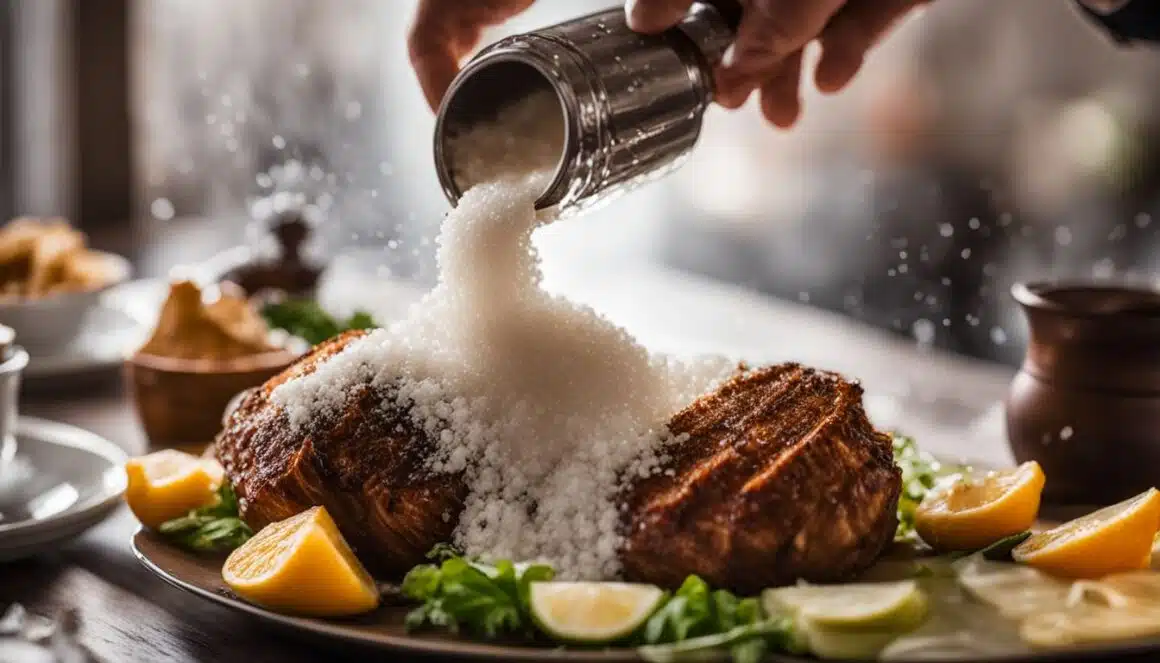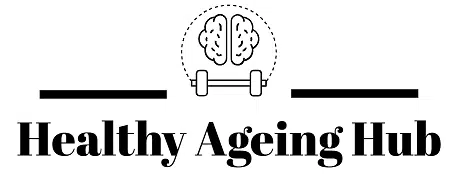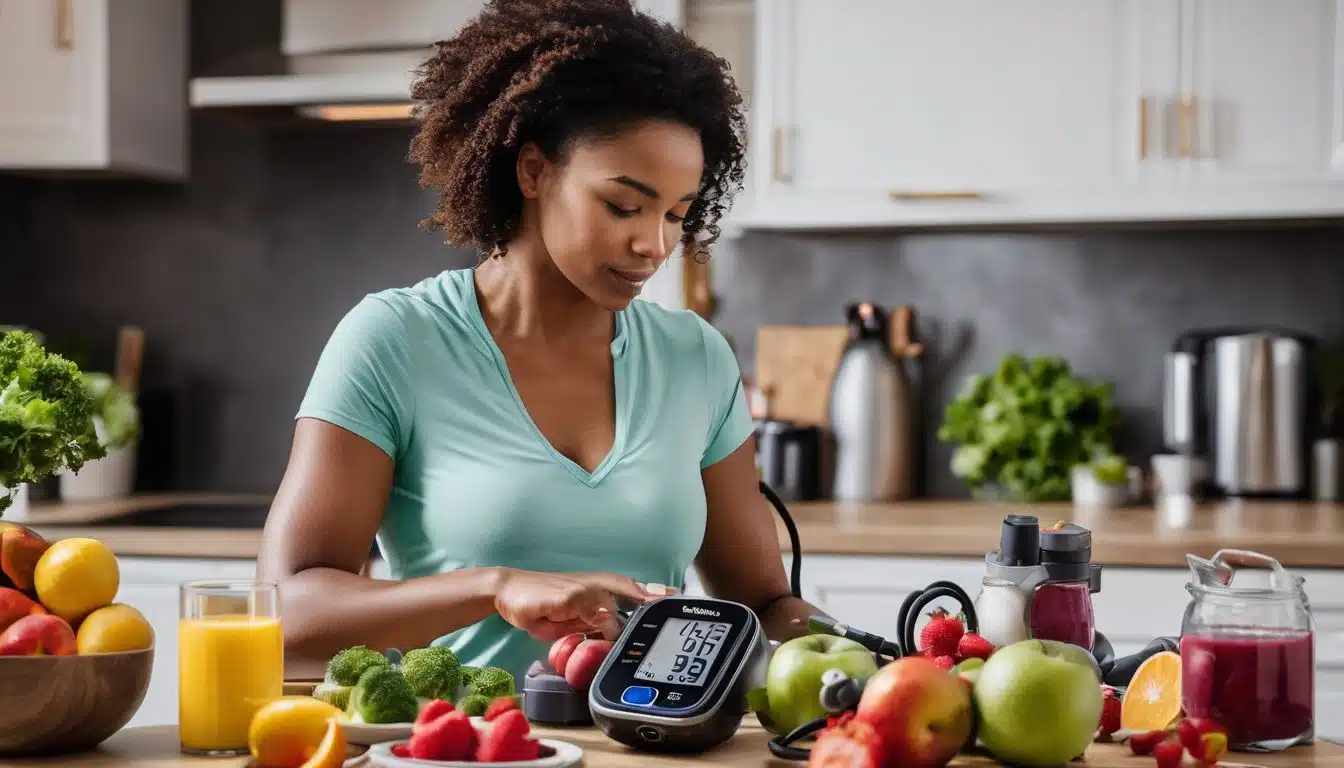Living with hypertension can feel like a constant battle. Did you know about 45% of American adults deal with high blood pressure? This blog post serves as your ally, sharing expert advice on lifestyle changes and medications to better manage this condition through effective lifestyle strategies for high blood pressure.
Let’s dive in and explore healthier ways to keep your blood pressure under control!
Key Takeaways
- About 45% of American adults have high blood pressure, which can lead to heart disease if not managed properly.
- Lifestyle changes like regular exercise, a healthy diet, reducing sodium intake, limiting alcohol consumption, quitting smoking, ensuring quality sleep, and practicing stress management can help cope with hypertension.
- Dietary recommendations include increasing potassium intake, reducing sugar and refined carbohydrate consumption, limiting processed food intake, incorporating dark chocolate into the diet in moderation, consuming high-protein foods like lean meats and low-fat dairy products,
- Prescription medications may be necessary to manage high blood pressure when lifestyle changes alone are insufficient. It is important to work closely with healthcare professionals to monitor blood pressure regularly and adjust medication as needed.
Understanding Hypertension

Hypertension is another name for high blood pressure. It needs you to be careful because it often has no signs or symptoms until it reaches a severe stage. Hypertension is a condition in which the force of blood against the walls of the arteries is consistently too high, causing strain on the heart and potentially leading to serious health complications. It is commonly referred to as the “silent killer” because it can go unnoticed for a long time if not regularly checked.
Hypertension is a significant risk factor for various cardiovascular diseases, including heart attack, stroke, and heart failure. It can also lead to kidney disease, vision problems, and other health issues. It is important to monitor blood pressure regularly and take necessary precautions to manage and control hypertension.
Lifestyle modifications such as maintaining a healthy diet low in sodium, engaging in regular exercise, managing stress levels, limiting alcohol consumption, and quitting smoking can help lower blood pressure. Additionally, medication may be prescribed by a healthcare professional to help manage hypertension.
Regular check-ups with a healthcare provider are important to detect and control hypertension. Even if there are no apparent signs or symptoms, individuals with risk factors such as family history, obesity, a sedentary lifestyle, or certain medical conditions should be particularly mindful of their blood pressure levels. . People may not know they have this health issue until a doctor tells them.
High blood pressure means the force of your blood against your artery walls is too strong. This can harm your arteries and lead to heart disease over time.
Being overweight increases the risk of hypertension. Too much salt (sodium) in your food, drinking too much alcohol, or smoking can also raise blood pressure levels higher than normal.
In some cases, other health issues like kidney disease might cause hypertension as well.
Effective Lifestyle Strategies for High Blood Pressure

Making regular exercise a part of your daily routine, adopting a healthy diet, reducing sodium consumption, limiting alcohol intake, quitting smoking, ensuring quality sleep, and practicing stress management can all help in coping with hypertension.
Regular Exercise
Doing physical activities each day can help control high blood pressure. Try to do things like walking, swimming or dancing for 30 minutes daily. This is a good way to make your heart strong and lower your blood pressure.
Losing weight also helps with hypertension. If you lose about one kilogram, it can cut down your blood pressure by 1 mm Hg. So, regular exercise not only keeps you fit but also lowers the risk of heart disease.
Healthy Diet
Eating well is key for heart health. Go for whole grains, fruits, and veggies. Opt for low-fat dairy items too. This type of food can drop blood pressure by up to 11 mm Hg. The DASH diet and the Mediterranean diet are good plans to follow.
Both diets help control blood pressure well. Also, add foods rich in potassium into your meals often as it helps lessen the effects of sodium on our body’s blood pressure levels.
Reducing Sodium Consumption
Salt makes food tasty. But too much of it hurts your heart. To help your heart, eat less salt (sodium). Try to have no more than 2,300 mg each day. This can lower your high blood pressure a little bit.
Foods that are processed or pre-made often have a lot of salt in them. So, try to eat fresh foods when you can. Using different herbs and spices instead of salt can also add flavor to your foods without the extra sodium.
Limiting Alcohol Intake
Drinking excessive amounts of alcohol can significantly increase blood pressure and contribute to hypertension. Alcohol consumption should be limited or avoided altogether, especially for individuals with hypertension or those at risk of developing it.
This is because alcohol can interfere with the effectiveness of blood pressure medications and also lead to weight gain, which further elevates blood pressure levels. It’s important to remember that moderation is key, and if you choose to drink alcohol, do so in moderation – no more than one drink per day for women and two drinks per day for men.
By limiting your alcohol intake, you can reduce the strain on your cardiovascular system and improve your overall health as part of Effective Lifestyle Strategies for High Blood Pressure.
Quitting Smoking
Quitting smoking is an important step in managing hypertension (high blood pressure). When you smoke, the chemicals in cigarettes can damage your blood vessels and increase your heart rate, leading to higher blood pressure.
By quitting smoking, you can help lower your blood pressure and reduce the risk of heart disease. It’s not easy to quit smoking, but there are many resources available to help you.
You can talk to your doctor about medications or nicotine replacement therapies that can assist with cravings. Remember, even if you’ve tried to quit before and haven’t been successful, don’t give up! Quitting smoking is one of the best things you can do for your health and well-being.
Ensuring Quality Sleep
Getting enough quality sleep is essential for managing hypertension. Sleep plays a crucial role in maintaining overall health and regulating blood pressure. Lack of sleep can contribute to elevated blood pressure levels and increase the risk of heart disease and stroke.
It is recommended to aim for 7-9 hours of uninterrupted sleep each night. Creating a relaxing bedtime routine, avoiding stimulating activities before bed, and ensuring a comfortable sleep environment can help promote better sleep quality.
Stress Management
Managing stress is crucial when it comes to controlling high blood pressure. Chronic emotional stress can contribute to elevated blood pressure levels, so finding effective ways to reduce stress is essential.
Stress reduction techniques like deep breathing exercises, meditation, and yoga can help in managing blood pressure. Engaging in regular physical activity such as aerobic exercise or strength training can also significantly lower stress levels and lead to better blood pressure control.
It’s important to prioritize self-care and find healthy outlets for managing stress, as this can have a positive impact on your overall well-being and hypertension management.
Dietary Recommendations for Hypertension

Increase potassium intake, reduce sugar and refined carbohydrate consumption, limit processed food intake, incorporate dark chocolate into your diet, consume high-protein foods, and drink adequate water.
Increasing Potassium Intake
Increasing your potassium intake can be beneficial for managing high blood pressure. Potassium is a mineral that helps balance the levels of sodium in your body, which is important for maintaining healthy blood pressure as part of Effective Lifestyle Strategies for High Blood Pressure.
The Dietary Approaches to Stop Hypertension (DASH) diet recommends consuming foods rich in potassium to lower blood pressure. Foods such as bananas, oranges, spinach, and avocados are good sources of potassium.
By including these foods in your diet, you can help counteract the effects of sodium on your blood pressure and improve your heart health. It’s important to note that while increasing potassium intake can be helpful, it should be done in conjunction with other lifestyle changes and under the guidance of a healthcare professional.
Reducing Sugar and Refined Carbohydrates
To manage hypertension, it is important to reduce your intake of sugar and refined carbohydrates. These include foods like sodas, candy, pastries, white bread, and pasta. When we consume too much sugar and refined carbs, our blood sugar levels spike quickly, leading to an increase in blood pressure.
By cutting back on these sugary and processed foods, you can help regulate your blood pressure levels and reduce the risk of heart disease. Instead, opt for whole grain products and choose natural sweeteners like honey or maple syrup in moderation.
It’s also a good idea to check food labels for hidden sugars and choose low-sugar options whenever possible.
Limiting Processed Foods
Limiting processed foods is an important step in managing hypertension. Processed foods are often high in unhealthy additives like sodium, sugar, and trans fats, which can raise blood pressure levels.
By reducing processed food consumption, blood pressure can be lowered by up to 11 mm Hg. Instead of relying on packaged snacks and meals, it’s better to choose fresh and whole foods like fruits, vegetables, lean proteins, and whole grains.
These natural choices are lower in sodium and healthier for our hearts.
Eating Dark Chocolate
Eating dark chocolate with a high cacao content is a delicious way to potentially lower blood pressure. Dark chocolate contains flavonoids, which are compounds that have antioxidant and anti-inflammatory properties.
These flavonoids can help relax the blood vessels and improve blood flow, thus reducing hypertension. However, it’s important to note that moderation is key when consuming dark chocolate for its potential health benefits.
Aim for dark chocolate with at least 70% cacao and limit your portion sizes to avoid excessive calorie intake. So go ahead and enjoy a small piece of dark chocolate as part of a balanced diet!
Consuming High-Protein Foods
Consuming high-protein foods is an important part of managing hypertension. Including foods like lean meats, fish, poultry, beans, and low-fat dairy products in your diet can help lower blood pressure.
Protein-rich foods have been found to reduce systolic blood pressure by about 4 mm Hg. The Dietary Approaches to Stop Hypertension (DASH) diet, which emphasizes the consumption of high-protein foods along with fruits, vegetables, whole grains, and low-fat dairy products, has been shown to effectively control blood pressure.
Additionally, including potassium-rich foods such as bananas and spinach can help counteract the effects of sodium on blood pressure levels. So make sure to include high-protein options in your meals for better management of hypertension.
Drinking Adequate Water
Drinking enough water is important for managing hypertension. Water helps to maintain healthy blood pressure levels and supports overall heart health. It is recommended to drink at least eight glasses of water per day, as this helps in flushing out excess sodium from the body, which can contribute to high blood pressure.
Adequate hydration also optimizes kidney function, allowing them to effectively regulate blood pressure. Moreover, drinking enough water can help prevent dehydration, a condition that may cause an increase in blood volume and elevate blood pressure.
To stay properly hydrated, it’s best to sip water throughout the day and limit consumption of sugary drinks or beverages with added salt or caffeine. By prioritizing regular intake of clean water, individuals with hypertension can support their overall well-being and manage their condition more effectively.
Medications and Supplements for Hypertension

Prescription medications are commonly used to treat hypertension, such as beta blockers and vasodilators, while garlic extract supplements may also offer some benefits.
Prescription Medications
Prescription medications can be an important part of managing high blood pressure. While lifestyle changes like exercise and healthy eating are recommended, sometimes they may not be enough to lower blood pressure to a healthy level.
In these cases, doctors may prescribe medications to help control blood pressure. These medications work in different ways, such as relaxing blood vessels or reducing the amount of water and salt in the body and could be part of an Effective Lifestyle Strategies for High Blood Pressure.
It is important for individuals taking prescription medications for hypertension to follow their doctor’s instructions and continue with other lifestyle changes for optimal management of high blood pressure.
Garlic Extract Supplements
Garlic extract supplements are a popular option for individuals with hypertension. These supplements have been shown to have a slight antihypertensive effect, meaning they can help lower blood pressure.
The active ingredient in garlic extract is called allicin, which is believed to contribute to its potential benefits in reducing blood pressure. However, it’s important to note that more research is needed to fully understand the effectiveness of garlic extract supplements for hypertension.
Consulting with a healthcare professional before starting these supplements is always recommended to ensure their safe and effective use.
Importance of Regular Checkups and Self-Monitoring
Regular checkups and self-monitoring are crucial for managing hypertension. By regularly visiting your healthcare provider, you can keep track of your blood pressure levels and make sure they are within a healthy range.
This is important because high blood pressure often has no symptoms, so regular checkups allow you to catch any potential issues early on. Self-monitoring at home using a blood pressure monitor can also help you stay informed about your health.
It allows you to keep an eye on your blood pressure readings between doctor’s visits and detect any patterns or changes that may require attention. Regular checkups and self-monitoring provide valuable information that can guide treatment decisions and help prevent complications related to hypertension.
So make sure to prioritize these practices in managing your condition effectively.
Seeking Support for Hypertension Management
Getting support from others can be an important part of managing hypertension. It’s not something you have to go through alone. Seeking support can provide emotional encouragement and practical advice to help you stay on track with your lifestyle changes and medication regimen.
You may find it helpful to join a support group where you can connect with others who are going through similar experiences. They can offer a listening ear, share tips and strategies, and provide motivation when you need it most.
Remember, managing hypertension is a journey, and having a strong support system can make all the difference in achieving your goals.
Conclusion
In conclusion, lifestyle changes and medication are important for coping with hypertension. By incorporating regular exercise, a healthy diet, and stress management techniques into your daily routine, you can lower your blood pressure and reduce the risk of heart disease.
It’s also crucial to work closely with healthcare professionals to monitor your blood pressure regularly and adjust medication as needed. With these proactive steps, you can take control of your health and live a better life with hypertension.
FAQs
How can I control hypertension through lifestyle changes?
You can control hypertension by losing extra pounds, having a heart-healthy diet low in saturated fat and cholesterol, doing resistance exercise like high-intensity interval training, and getting a good night’s sleep.
What is the role of weight loss in managing hypertension?
Weight loss helps lower blood pressure. It also reduces the risk of other chronic conditions like diabetes and cardiovascular disease.
Can lack of sleep cause high blood pressure?
Yes, lack of sleep or conditions like obstructive sleep apnea can lead to higher blood pressure levels.
How often should I monitor my blood pressure at home?
Using home blood pressure monitors lets you keep regular check-ups on your blood pressure recordings, but always refer to your doctor for how frequently you should monitor it.
What kind of diet is best for managing high cholesterol and hypertension?
A low carb diet or a low fat diet with more fiber mixed in combined with sugar restriction can be good for controlling both these issues according to Mayo Clinic Diet guides.
Is medication necessary for handling hypertension?
Sometimes anti-hypertensive medications are needed along with dietary modifications if lifestyle changes alone don’t help reach your blood pressure treatment goals.
What is high blood pressure?
High blood pressure, also known as hypertension, is a medical condition where the force of blood against the walls of blood vessels is consistently too high.
How can I lower my blood pressure?
To lower your blood pressure, you can try making lifestyle changes such as maintaining a healthy diet, engaging in regular physical activity, managing stress, limiting alcohol consumption, and quitting smoking.
What is the role of sodium in high blood pressure?
Sodium, commonly found in table salt, can contribute to high blood pressure. It is important to monitor and control your sodium intake as part of managing high blood pressure.
What are some dietary approaches to stop hypertension (DASH)?
The Dietary Approaches to Stop Hypertension (DASH) is a dietary plan that emphasizes consuming fruits, vegetables, whole grains, lean proteins, and low-fat dairy products. It is known to help lower blood pressure.
Are there any medications to lower blood pressure?
Yes, there are various blood pressure medications available that can help manage high blood pressure. It is important to consult with a healthcare professional to determine the most suitable medication for your condition.
Can lifestyle changes alone treat high blood pressure?
For some individuals, adopting a healthy lifestyle can effectively control high blood pressure without the need for medication. However, this may not be the case for everyone. Consult with your doctor to determine the best approach for you.
What are the natural ways to lower blood pressure?
Natural ways to lower blood pressure include regular physical activity, following a healthy diet, reducing stress levels, limiting alcohol intake, and avoiding smoking.
What could be the consequences of high blood pressure?
Untreated high blood pressure can lead to serious health issues such as heart disease, stroke, kidney damage, and other complications affecting various organs in the body.
How can I measure my blood pressure at home?
You can measure your blood pressure at home using a home blood pressure monitor. Follow the instructions provided with the device and ensure proper cuff placement for accurate readings.

